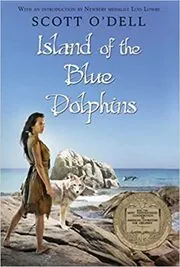Island of the Blue Dolphins Summary
Author: Scott O'Dell
This page offers our Island of the Blue Dolphins summary (Scott O'Dell's book). It opens with an overview of the book, and follows with a concise chapter-by-chapter summary.
Drafted with AI assistance and reviewed by a human editor.
As an Amazon Associate, we earn from qualifying purchases (at no extra cost to you).
This book has 1 recommender!
Overview
In the initial development of the narrative, a pair of siblings, Karana and Ramo, spot an incoming ship to their island, Ghalas-at. The village chief, their father Chowig, greets the visitors who are led by a Russian captain, Orlov. Accompanying Orlov is a native American tribe, the Aleuts, who wish to hunt otters on the island in exchange for jewelry and iron spearheads. Despite past conflicts with the Aleuts, an accord is reached. However, conflict arises when the Aleuts prepare to depart, providing insufficient payment. A bloody battle ensues, resulting in the Aleuts' escape and the death of many villagers, including the chief, Chowig.
In the aftermath of the tragic winter, a new chief, Kimki, decides to abandon Ghalas-at for a new territory. A white-sailed ship arrives, purportedly sent by Kimki to transport the villagers to their new home. In the haste to embark, Ramo misplaces his hunting spear, and despite Karana's pleas, he insists on retrieving it. As the ship departs, Karana spots Ramo on the beach and dives into the sea, swimming back to the island. Now stranded, Karana and Ramo toil to survive, hoping for the ship's return. Sadly, Ramo is killed by wild dogs, prompting Karana to abandon her village. She builds a camp on a headland and, challenging tribal laws, arms herself. Despite fruitless attempts to paddle off the island in a leaky canoe, she ultimately constructs a permanent shelter and stronger weapons.
Karana then exacts revenge on the wild dogs, mortally wounding the pack leader. Surprisingly, she nurses the injured dog back to health, resulting in a strong bond between them and earning the dog the name Rontu. The Aleuts return to Ghalas-at, forcing Karana to take refuge in a cave. There, she befriends Tutok, an Aleut girl, who discovers her. They become close despite the language barrier but part ways when the Aleuts depart. Living in solitude, Karana befriends more animals, including Rontu's son, whom she names Rontu-Aru. Eventually, another ship arrives, and Karana, yearning for human companionship, departs Ghalas-at with Rontu-Aru.
Edited by
Software engineer whose passion for tracking book recommendations from podcasts inspired the creation of MRB.
Lead investor at 3one4 Capital whose startup expertise and love for books helped shaped MRB and its growth.







Comments
Did we miss something? Have feedback?
Help us improve this page by sharing your thoughts